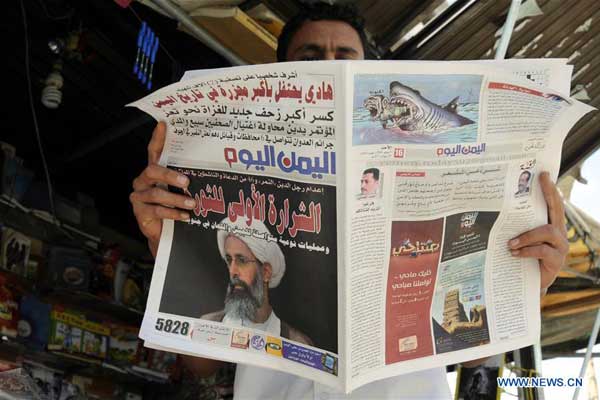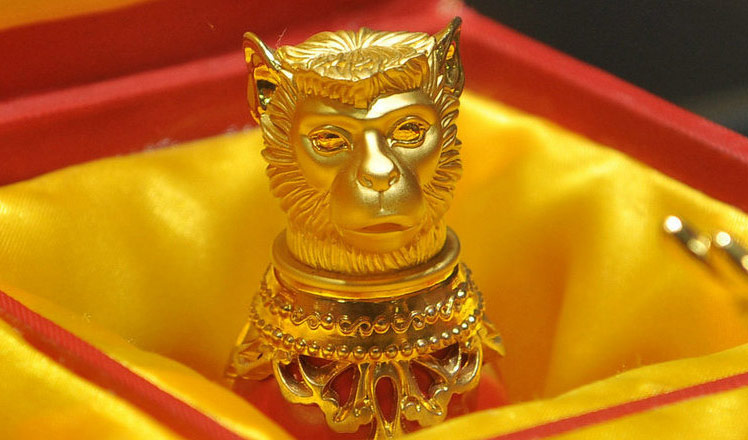Saudi Arabia cuts ties with Iran after embassy in Tehran attacked
Updated: 2016-01-04 19:37
(Xinhua)
|
||||||||
 |
|
A man reads the newspaper showing the photo of the prominent Shi'ite cleric Sheikh Nimr al-Nimr in Sanaa, Yemen, Jan 3, 2016. Saudi Interior Ministry announced on Saturday the execution of 47 people on terrorist charges, including the dissident Shi'ite leader. [Photo/Xinhua] |
RIYADH -- Saudi Arabia announced on Saturday cutting off diplomatic ties with Iran and asked all Iranian diplomats to leave within 48 hours, local media reported.
Saudi Foreign Minister Adel al-Jubeir said he has informed the UN Security Council of the attack on the Saudi diplomatic mission in Iran late Saturday, adding that those Saudi diplomats had reached Dubai, the UAE, safely.
He accused the Iranian authorities of not taking any measures to prevent the attacks against the embassy in Tehran and the consulate in the Iranian city of Mashhad.
On late Saturday, angry Iranian protesters stormed the Saudi diplomat mission to protest the Saudi execution of 47 individuals on terrorism charges, including a Saudi Shiite cleric, Namir Al Namir, a member of the Saudi Shiite community.
The attacks violated international agreements, al-Jubeir said, who also cited the Iranians' previous attacks on U.S. and British embassies.
He accused Iran of providing protection for Al-Qaeda through weapon trafficking.
For his part, Iranian President Hassan Rouhani used the word "inhuman" to strongly denounce the Saudi execution.
He also urged relevant Iranian departments to prosecute those "extremist individuals" who attacked the embassy and the Saudi consulate in the northeastern city of Mashhad.
Though Saudi Arabia has cut diplomatic ties with Iran, Iranian Deputy Foreign Minister Hossein Amir-Abdollahian responded that Riyadh's move will by no way cover up "its major mistake of executing Sheikh Nimr."
Ayatollah Ali Khamenei, Iran's top leader, predicted "divine vengeance" for al-Nimr's execution.
In the Middle East, tensions between Iran and Saudi Arabia have been lasted for decades. The Saudi Shiite cleric's execution further intensified the rivalry.
Al-Nimr's execution by Saudi Arabia led to a series of protests in Shiite-majority countries across the Middle East.
Iraq expressed anger over Riyadh's execution. Iraqi top Shiite cleric Grand Ayatollah Ali al-Sistani slammed the execution as an "unjust aggression."
In Istanbul, people gathered outside Saudi Arabia's consulate holding posters of al-Nimr, and shouted "Saudi Arabia will pay the price."
Some Western countries also voiced their concern about al-Nimr's execution.
Washington said that in order to ease tension, it hoped regional leaders could deepen diplomatic ties and take "affirmative steps."
"We believe that diplomatic engagement and direct conversations remain essential in working through differences and we will continue to urge leaders across the region to take affirmative steps to calm tensions," said an official of U.S. President Barack Obama's administration.
On Sunday, France showed its grief over the mass execution and restated that France would stand against death penalty "in all places and circumstances."
- Top planner targets 40% cut in PM2.5 for Beijing-Tianjin-Hebei cluster
- Yearender: Predictions for 2016 through 20 questions
- Asia's largest underground railway station opens in Shenzhen
- Shanghai bans drug-using actors, drivers
- Clamping down to clean up the air
- Yearender: Ten most talked-about newsmakers in 2015
- Over 1 million refugees have fled to Europe by sea in 2015: UN
- Turbulence injures multiple Air Canada passengers, diverts flight
- NASA releases stunning images of our planet from space station
- US-led air strikes kill IS leaders linked to Paris attacks
- DPRK senior party official Kim Yang Gon killed in car accident
- Former Israeli PM Olmert's jail term cut, cleared of main charge

 The world in photos: Dec 28 - Jan 3
The world in photos: Dec 28 - Jan 3
 Zodiac golden accessories make a splash in the new year
Zodiac golden accessories make a splash in the new year
 Picutre review of the sky in Beijing, 2015
Picutre review of the sky in Beijing, 2015
 Confinement center provides high-end service to new moms
Confinement center provides high-end service to new moms
 Gorgeous rime scenery in Northwest China's Xinjiang
Gorgeous rime scenery in Northwest China's Xinjiang
 127th Tournament of Rose Parade celebrated to embrace 2016
127th Tournament of Rose Parade celebrated to embrace 2016
 Yearender: China's proposals on world's biggest issues
Yearender: China's proposals on world's biggest issues
 NASA reveals entire alphabet but F in satellite images
NASA reveals entire alphabet but F in satellite images
Most Viewed
Editor's Picks

|

|

|

|

|

|
Today's Top News
Shooting rampage at US social services agency leaves 14 dead
Chinese bargain hunters are changing the retail game
Chinese president arrives in Turkey for G20 summit
Islamic State claims responsibility for Paris attacks
Obama, Netanyahu at White House seek to mend US-Israel ties
China, not Canada, is top US trade partner
Tu first Chinese to win Nobel Prize in Medicine
Huntsman says Sino-US relationship needs common goals
US Weekly

|

|







